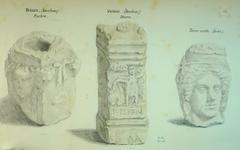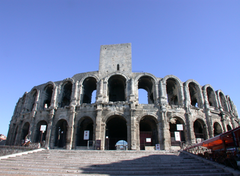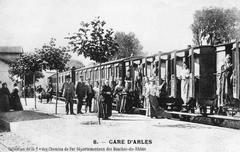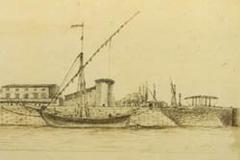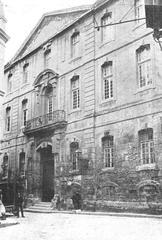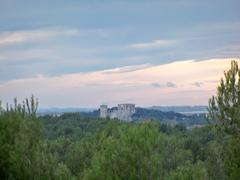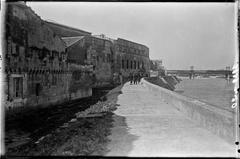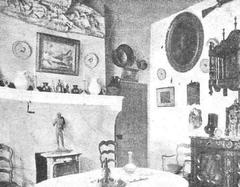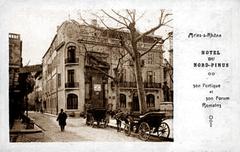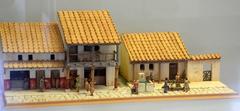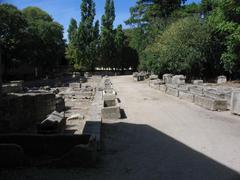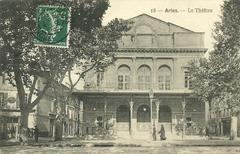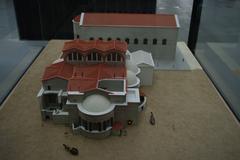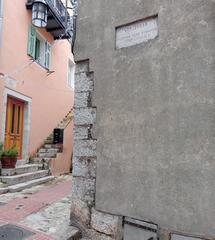Roure Mansion Visiting Hours, Tickets, and Travel Guide: Arles Historical Site
Date: 14/06/2025
Introduction to Roure Mansion in Arles
Nestled in the historic heart of Arles, France, the Roure Mansion (Hôtel de Roure) stands as a testament to the city’s rich architectural and cultural evolution. Built in the 17th century by the prominent Roure family, the mansion embodies a seamless transition from Arles’ Roman and medieval roots through the Renaissance to the early modern period. Its façade of local limestone, ornate stone carvings, and tranquil courtyard offer a window into the city’s social history and the rise of its bourgeoisie. Today, Roure Mansion is not only a preserved monument but also a vibrant cultural venue, hosting exhibitions for events such as the internationally renowned Rencontres d’Arles photography festival. This guide provides detailed visitor information—ranging from hours and ticketing to accessibility and nearby attractions—to help you plan a rewarding visit. For up-to-date details, consult the official Arles tourism website or the PHmuseum event page.
Table of Contents
- Introduction
- Historical Context and Evolution
- Architectural Significance
- Visitor Information: Hours, Tickets & Accessibility
- Guided Tours and Special Events
- Travel Tips & Nearby Attractions
- Frequently Asked Questions (FAQ)
- Conclusion
- References
Historical Context and Evolution
The Roure Mansion traces its origins to the 17th century, when Arles was a thriving cultural and economic center in Provence. The Roure family, notable city patrons, commissioned the mansion to reflect their status and the city’s evolving urban landscape. Located within Arles’ UNESCO World Heritage historic center, the mansion sits amid Roman and Romanesque monuments, providing context to Arles’ multi-layered history (Nomads Travel Guide).
Romanesque and Medieval Foundations
While the current structure was completed in the 17th century, its site and some foundational elements date back to the 15th century, reflecting the city’s medieval resurgence. The original Romanesque features—such as thick stone walls and small, arched windows—testify to centuries of adaptation and continuity (The Creative Adventurer).
Renaissance Transformations
In the 16th and 17th centuries, the Roure family renovated the mansion, introducing Renaissance elements like large mullioned windows, sculpted stonework, and symmetrical façades. The central courtyard, grand staircase with carved balustrades, and heraldic motifs highlight the family’s influence and the era’s architectural trends (Architectural Digest).
Decorative Elements and Preservation
Distinctive features include floral stone carvings, coats of arms, painted ceilings, wooden beams, and tiled floors—hallmarks of Provençal mansions. Over time, the mansion has been restored to maintain its structural integrity and original charm, with accessibility improvements made where possible (Wanderlog).
Visitor Information: Hours, Tickets & Accessibility
Opening Hours
- Typical Hours: Tuesday to Sunday, 10:00 AM – 6:00 PM. Closed Mondays and public holidays.
- Note: Interior access is often limited to special events, guided tours, or festivals. Always confirm current opening hours on the Arles tourism website.
Tickets and Admission
- Standard Admission: €8–€12 for adults. Discounts available for students, seniors, and groups.
- Free Entry: Children under 12.
- Combined Passes: Roure Mansion may be included in multi-site tickets like the Pass Avantage or Pass Liberté. Check for current inclusions (Explore Your Bucket List).
- Purchase: Tickets available on-site or online.
Accessibility
While some areas are accessible for visitors with reduced mobility, historic features such as narrow staircases and uneven floors may restrict access to parts of the building. Contact the site or check the official website for detailed accessibility information.
Guided Tours and Special Events
- Guided Tours: Offered in French and English (other languages on request), usually by advance booking. Tours provide in-depth context on architecture, history, and the Roure family’s legacy.
- Special Events: Roure Mansion is a venue for exhibitions, concerts, and cultural activities, especially during the Rencontres d’Arles festival (PHmuseum).
- Booking: Reserve tours and event tickets in advance, particularly during festivals or peak seasons.
Travel Tips & Nearby Attractions
Getting There
- Location: Central Arles, within the pedestrianized historic district.
- By Train: 15-minute walk from Gare d’Arles.
- By Car: Public parking available on the outskirts; old town is largely car-free (Arles Tourism Office).
Nearby Historical Sites
- Roman Amphitheater: Iconic UNESCO monument.
- Saint-Trophime Church: Renowned for its Romanesque portal and cloister.
- Place de la République: Main square with café culture.
- Museon Arlaten & Musée Réattu: Explore Provençal culture and art.
Additional Tips
- Best Time to Visit: Spring and autumn for milder weather and fewer crowds.
- Accessibility: Wear comfortable shoes for cobblestone streets.
- Photography: Permitted outside; interior photography varies with events.
Frequently Asked Questions (FAQ)
Q: Are tickets available online?
A: Yes, purchase through the Arles tourism website or at the entrance.
Q: Is the mansion wheelchair accessible?
A: Some areas are accessible, but there may be limitations due to historic architecture.
Q: Are guided tours in English available?
A: English tours can be arranged in advance.
Q: Can I take photos inside?
A: Exterior photography is allowed; interior policies depend on the event or exhibition.
Q: Which attractions are nearby?
A: The Roman amphitheater, Saint-Trophime Church, and Place de la République are all within walking distance.
Conclusion
Roure Mansion is a highlight of Arles’ UNESCO-listed historic center, offering visitors a unique blend of architectural grandeur, cultural history, and dynamic programming. Its central location makes it an ideal starting point for exploring Arles’ Roman past, Provençal traditions, and vibrant arts scene. For updates on hours, tickets, and events, consult the Arles tourism website and consider downloading the Audiala app for guided tours and real-time information. Whether you’re drawn by history, architecture, or art, Roure Mansion promises an inspiring and memorable experience.
References
- Nomads Travel Guide – Self-Guided Walking Tour of Arles
- PHmuseum – OpenWalls Spotlight 2025
- Architectural Digest – Arles France Art Destination
- The Creative Adventurer – Historical Walking Tour of Ancient Arles
- Wanderlog – Historic Buildings and Sites in Arles
- Explore Your Bucket List – What to Do in Arles
- Arles Tourism Office – Guided Visits
